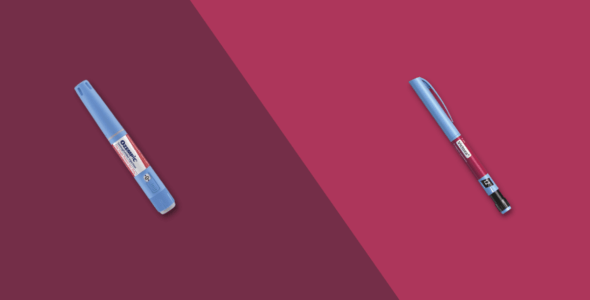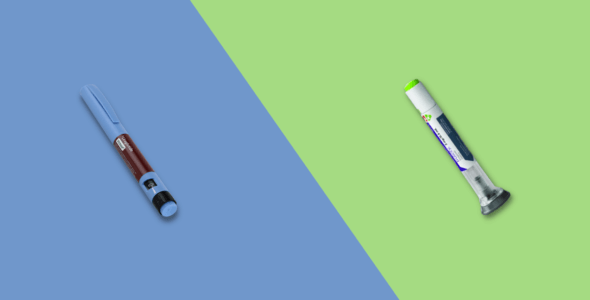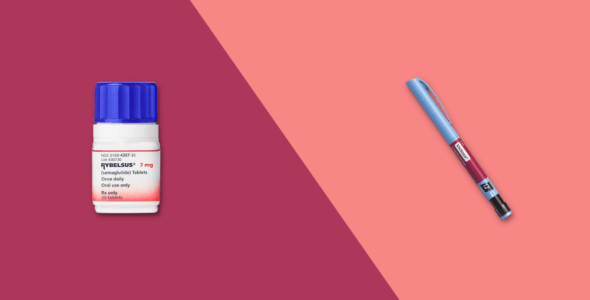What is Victoza Uses, warnings & interactions
Victoza is a glucagon-like peptide-1 (GLP-1) receptor agonist whose active ingredient is liraglutide. It was approved in 2010 by the U.S. Food and Drug Administration (FDA) along with a healthy diet and exercise to lower blood sugar levels in patients 10 years of age and older with type 2 diabetes. It is also used to reduce heart attacks and stroke in type 2 diabetic patients with heart disease.
If your doctor has prescribed Victoza to you, you may want to know more about what it is and how it works. Here we’ll explain what Victoza is used for, how it works, its side effects, and more.
What is Victoza used for?
Victoza (liraglutide) is an injectable diabetes medication that is manufactured by Novo Nordisk. It is FDA-approved:
- as an adjunct to a reduced-calorie diet and increased physical activity to improve glycemic control in patients 10 years and older with type 2 diabetes mellitus (T2DM).
- to reduce the risk of serious adverse cardiovascular events in adults with T2DM and known heart disease.
Victoza is not approved by the FDA to treat type 1 diabetes mellitus (T1DM).
How does Victoza work?
Victoza is considered an incretin mimetic that binds and activates the GLP-1 receptor in your pancreas. GLP-1 is an essential hormone that helps manage blood glucose levels after you eat carbohydrates or fats. In type 2 diabetic patients, GLP-1 levels are decreased. By activating the GLP-1 receptor, Victoza increases the release of insulin, blocks the liver from making more sugar, and slows down digestion.
What are the most commonly prescribed doses of Victoza?
- 6 mg/ml injection solution in a pre-filled, single-patient-use pen that delivers doses of 0.6 mg, 1.2 mg, or 1.8 mg
Before taking Victoza
Before starting Victoza, tell your doctor if you have any of the following medical conditions:
- Pancreas, kidney, or liver impairment
- Digestion problems or delayed emptying of your stomach
How to take Victoza
- Read the Instructions for Use, Prescribing Information, and Medication Guide, including the Boxed Warning that come with Victoza.
- Use Victoza exactly as prescribed by your healthcare provider. They should show you how to use Victoza before you administer your first dose.
- Victoza is given once a day at any time of the day. You can take Victoza with or without food.
- Victoza is injected under the skin (subcutaneous) in your stomach, thigh, or upper arm. You should never inject Victoza into your muscle or vein.
- Rotate your injection site with each injection of Victoza to decrease your risk of cutaneous amyloidosis (lumps under your skin).
- If you miss a dose of Victoza, skip it and take your next dose at its scheduled time. Do not take extra doses of Victoza to make up for the missed dose.
- If you think you have taken too much Victoza, call your healthcare provider immediately or seek medical attention.
- Your Victoza pen should be discarded 30 days after its first use.
Victoza contraindications
- Personal or family history of a type of thyroid cancer called medullary thyroid carcinoma (MTC)
- Patients with multiple Endocrine Neoplasia syndrome type 2
- Hypersensitivity to Victoza or any of its inactive ingredients
Victoza warnings
- Increased risk of thyroid tumors. Tell your doctor if you get a lump or swelling in your neck, hoarseness, difficulty swallowing, or shortness of breath.
- Severe pancreatitis has been reported with the use of Victoza.
- Acute gallbladder disease.
- Hypoglycemia, when used along with an insulin secretagogue (glimepiride) or insulin.
- Increased risk of kidney impairment.
- Discontinue Victoza and promptly seek medical assistance if a severe allergic reaction is suspected.
Victoza drug interactions
When Victoza is taken with other medications, it can change how they work or increase the frequency and severity of side effects. Make sure your doctor is aware of all prescription drugs, over-the-counter medications, vitamins, and herbal supplements you take as:
- there is an increased risk of hypoglycemia when Victoza is used along with insulin secretagogues (sulfonylureas) or insulin.
- Victoza delays gastric emptying so it may have an impact on the absorption of oral medications taken along with it.
Victoza side effects
The most common side effects of Victoza in clinical trials when compared to placebo include:
- Nausea
- Injection site reaction
- Vomiting
- Diarrhea
- Constipation
- Decreased appetite
- Headache
- Dizziness
- Upset stomach
- Hypoglycemia (low blood sugar)
In rare instances, Victoza can cause more serious side effects. These can include:
- Severe hypersensitivity reactions including hives, angioedema, and trouble breathing
- Increased risk of thyroid cancer
- Pancreatitis
- Gallstones
- Kidney problems
- Increased heart rate
Contact your healthcare provider for medical advice about any adverse effects you experience while taking Viberzi. You can report your side effects to the FDA at 1-800-FDA-1088 or www.fda.gov/medwatch.
Victoza alternatives
There are other weight loss medications that your healthcare professional can prescribe if Victoza is not right for you. They will vary by different factors such as side effects and costs. Some FDA-approved alternatives to Victoza include:
- Ozempic (semaglutide)
- Rybelsus (semaglutide)
- Trulicity (dulaglutide)
- Byetta (exenatide)
- Adlyxin (lixisenatide)
- Glucophage (metformin)
How does Victoza compare to Trulicity?
Victoza and Trulicity are both given as injections under the skin to treat T2DM in adults along with diet and exercise. Victoza can be used in patients with T2DM as young as 10 years old. Victoza is also indicated to reduce heart attack and stroke in adults with T2DM and heart disease. Victoza is given once a day while Trulicity is given once a week. Both of these medications have very similar side effects and drug interactions.
Victoza and Trulicity have been directly compared in a clinical study with adult patients that have T2DM. The patients in this study also took metformin along with Victoza or Trulicity for 26 weeks. It showed that both medications were equally effective in improving patients’ blood glucose levels.
There is currently no generic alternative available for either medication. Victoza has an average cost of over $1,100 for #3, 18mg/3ml pens while Trulicity costs approximately $1,000 for #4, 0.75mg/0.5ml pens.
Victoza FAQs
Is Victoza a type of insulin?
No, Victoza is not an insulin product. It does stimulate your pancreas to produce insulin. Victoza is similar to a hormone in your body called GLP-1 that helps control glucose, insulin, and gastric emptying.
How much weight can you lose with Victoza?
While Victoza is not indicated for weight loss, you may lose weight while using this medication. A Victoza study of almost 750 people with T2DM showed that doses of 1.8mg and 1.2mg led to weight loss. The people who took Victoza 1.8mg lost around 5.5lbs (2.5kg) while those taking Victoza 1.2mg lost around 4.5lbs (2.1kg).
How often do you take Victoza?
Victoza is typically given as a subcutaneous injection once a day at any time of the day. You can take Victoza with or without food.
How do I store Victoza?
Before its first use, you should store your Victoza pen in the refrigerator between 36ºF to 46ºF (2ºC to 8ºC). Do not store it in the freezer and do not use Victoza if it has been frozen. After its first use, the Victoza pen can be stored for up to 30 days at room temperature between 59°F to 86°F (15°C to 30°C) or in a refrigerator between 36°F to 46°F (2°C to 8°C).
How long does it take for Victoza to start working?
According to the manufacturer, Victoza starts lowering blood sugar levels in adults with T2DM in as soon as 2 weeks.
Can you take Victoza while you are pregnant or breastfeeding?
The risk of fetal harm with the use of Victoza is not known. You should only use Victoza during pregnancy if the benefit outweighs the potential risks to the fetus. There is no data on whether Victoza is found in breast milk or the effects Victoza may have on the infant. You should always discuss the risks and benefits of any medication with your healthcare provider if you are pregnant, plan on becoming pregnant, or are breastfeeding.
Is there a generic for Victoza?
Currently, there is no generic for Victoza available on the market. However, you can still save on brand-name drugs like Victoza through NiceRx if eligible for assistance.





